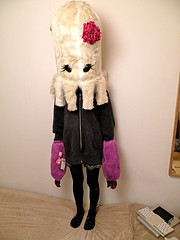This article originally appeared on Geek Feminism.
Warning for quoted misogyny, Islamophobia and descriptions of violence against women and harassment, not to mention Oppression Olympics.
On June 20, Rebecca Watson of Skepchick posted a video discussing a panel she spoke on at the World Atheist Convention in early June. Here’s an excerpt of the relevant segment:
And I was on a panel with AronRa and Richard Dawkins [which] was on ‘communicating atheism.’ They sort of left it open for us to talk about whatever we wanted, really, within that realm. I was going to talk about blogging and podcasting, but, um, a few hours prior to that panel, there was another panel on women atheist activists… I don’t assume that every woman will have the same experience that I’ve had, but I think it’s worthwhile to publicize the fact that some women will go through this, and, um, that way we can warn women, ahead of time, as to what they might expect, give them the tools they need to fight back, and also give them the support structure they need to, uh, to keep going in the face of blatant misogyny…
So, thank you to everyone who was at that conference who, uh, engaged in those discussions outside of that panel, um, you were all fantastic; I loved talking to you guys—um, all of you except for the one man who, um, didn’t really grasp, I think, what I was saying on the panel…? Because, um, at the bar later that night—actually, at four in the morning—um, we were at the hotel bar, 4am, I said, you know, “I’ve had enough, guys, I’m exhausted, going to bed,” uh, so I walked to the elevator, and a man got on the elevator with me, and said, “Don’t take this the wrong way, but I find you very interesting, and I would like to talk more; would you like to come to my hotel room for coffee?”…
I’ll just sort of lay it out that I was a single woman, you know, in a foreign country, at 4am, in a hotel elevator with you, just you, and—don’t invite me back to your hotel room, right after I’ve finished talking about how it creeps me out and makes me uncomfortable when men sexualize me in that manner.
This excerpt is from Melissa McEwan’s full transcript of the relevant section of the audio, which is available at Shakesville. There’s more interesting stuff in the full transcript, including an example of the kind of dynamic where an individual woman who hasn’t experienced sexism denies it exists at all. But Watson’s criticism of the man who sexually approached her in the elevator has let to the Internet exploding, predictably enough. Especially when Richard Dawkins commented, most unsympathetically.
Here’s the setup:
- PZ Myers, Always name names! [beware comments]:
It’s not enough. Maybe we should also recognize that applying unwanted pressure, no matter how politely phrased, is inappropriate behavior.
- Richard Dawkins, comment on “Always name names!”:
Dear Muslima… Think of the suffering your poor American sisters have to put up with… Only this week I heard of one, she calls herself Skep”chick”, and do you know what happened to her? A man in a hotel elevator invited her back to his room for coffee… And you, Muslima, think you have misogyny to complain about! For goodness sake grow up, or at least grow a thicker skin.
- Richard Dawkins, comment on “Always name names!”:
Rebecca’s feeling that the man’s proposition was ‘creepy’ was her own interpretation of his behaviour, presumably not his. She was probably offended to about the same extent as I am offended if a man gets into an elevator with me chewing gum. But he does me no physical damage and I simply grin and bear it until either I or he gets out of the elevator. It would be different if he physically attacked me.
- PZ Myers, Twitter:
For those curious, confirmed: those comments were from Richard.
Commentary (warning: some of these links contain extensive discussion of rape, including news coverage): Continue reading “Sexual harassment discussion in the atheist and skeptical communities”



